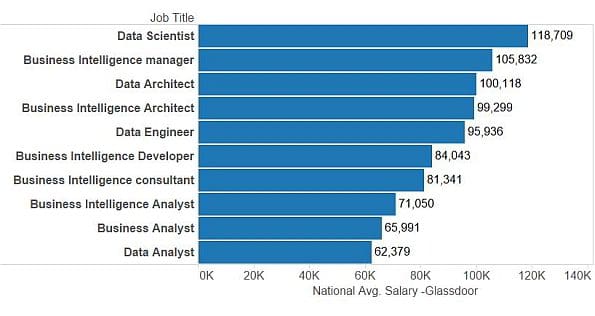The field of Business Intelligence (BI) has experienced significant growth over the years, driven by the increasing demand for data-driven decision-making and the need for organizations to stay competitive in a rapidly changing business landscape. As we enter the year 2025, the BI industry is poised for continued growth, with new technologies, tools, and methodologies emerging to support the development of more sophisticated and effective BI solutions.

One of the key factors influencing the BI industry is the salary landscape. BI professionals, including data analysts, data scientists, and BI developers, are in high demand, and their salaries are expected to rise in 2025. In this article, we will explore the current state of BI salaries, trends, and predictions for 2025, as well as provide insights into the skills and qualifications required to succeed in this field.
Current State of BI Salaries
According to recent surveys and reports, the average salary for BI professionals in the United States ranges from $80,000 to over $140,000 per year, depending on factors such as location, industry, experience, and specific job title. For example:
- Data Analyst: $80,000 – $110,000 per year
- BI Developer: $90,000 – $130,000 per year
- Data Scientist: $110,000 – $160,000 per year
- Senior BI Manager: $140,000 – $180,000 per year
These figures are expected to rise in 2025, driven by the increasing demand for BI professionals and the need for organizations to invest in data-driven decision-making.
Trends and Predictions for 2025
Several trends and predictions are expected to shape the BI salary landscape in 2025:
- Increased demand for advanced analytics skills: With the growing adoption of artificial intelligence, machine learning, and other advanced analytics technologies, BI professionals with expertise in these areas are expected to be in high demand, driving up salaries.
- Cloud-based BI solutions: The shift to cloud-based BI solutions is expected to continue, with more organizations adopting cloud-based platforms such as Amazon Web Services, Microsoft Azure, and Google Cloud Platform. This will drive demand for BI professionals with expertise in cloud-based technologies.
- Growing importance of data governance: As organizations increasingly rely on data-driven decision-making, data governance is becoming a critical aspect of BI. BI professionals with expertise in data governance, data quality, and data security are expected to be in high demand.
- Rise of the Citizen Data Scientist: With the increasing availability of self-service BI tools and data science platforms, the role of the citizen data scientist is expected to grow, enabling non-technical users to perform data analysis and analytics tasks.
- Skills gap: The BI industry is expected to face a skills gap, with a shortage of professionals with expertise in advanced analytics, cloud-based technologies, and data governance. This will drive up salaries for BI professionals with these skills.
Skills and Qualifications Required
To succeed in the BI industry, professionals need to possess a range of skills and qualifications, including:
- Technical skills: Proficiency in BI tools such as Tableau, Power BI, QlikView, and SAP BusinessObjects, as well as programming languages such as Python, R, and SQL.
- Data analysis and analytics skills: Ability to collect, analyze, and interpret large datasets, as well as develop and implement data models and predictive analytics solutions.
- Communication and presentation skills: Ability to communicate complex data insights and analytics results to non-technical stakeholders, as well as present findings and recommendations to senior management.
- Business acumen: Understanding of business operations, market trends, and industry dynamics, as well as the ability to align BI solutions with business objectives.
- Certifications and education: Relevant certifications, such as Certified Data Analyst (CDA) or Certified Business Intelligence Analyst (CBIA), as well as a bachelor’s or master’s degree in a related field, such as computer science, statistics, or mathematics.
FAQ
- What is the average salary for a BI professional in 2025?
The average salary for a BI professional in 2025 is expected to range from $90,000 to over $160,000 per year, depending on factors such as location, industry, experience, and specific job title. - What skills are in highest demand for BI professionals in 2025?
Advanced analytics skills, cloud-based technologies, and data governance are expected to be in high demand for BI professionals in 2025. - How can I get started in a BI career?
To get started in a BI career, consider acquiring technical skills in BI tools and programming languages, as well as developing data analysis and analytics skills. Additionally, look for certifications and education programs that can help you build a strong foundation in BI. - What are the top industries for BI jobs in 2025?
The top industries for BI jobs in 2025 are expected to be finance, healthcare, retail, and technology, with a growing demand for BI professionals in these sectors. - How can I stay up-to-date with the latest BI trends and technologies?
To stay up-to-date with the latest BI trends and technologies, consider attending industry conferences, workshops, and webinars, as well as following BI thought leaders and industry publications.
Conclusion
The BI industry is expected to experience significant growth in 2025, driven by the increasing demand for data-driven decision-making and the need for organizations to stay competitive. BI professionals with expertise in advanced analytics, cloud-based technologies, and data governance are expected to be in high demand, driving up salaries. To succeed in this field, professionals need to possess a range of skills and qualifications, including technical skills, data analysis and analytics skills, communication and presentation skills, business acumen, and certifications and education. By staying up-to-date with the latest BI trends and technologies, and acquiring the necessary skills and qualifications, BI professionals can position themselves for success in this exciting and rapidly evolving field.
Closure
Thus, we hope this article has provided valuable insights into Business Intelligence Salary 2025: Trends, Predictions, and Insights. We hope you find this article informative and beneficial. See you in our next article!


